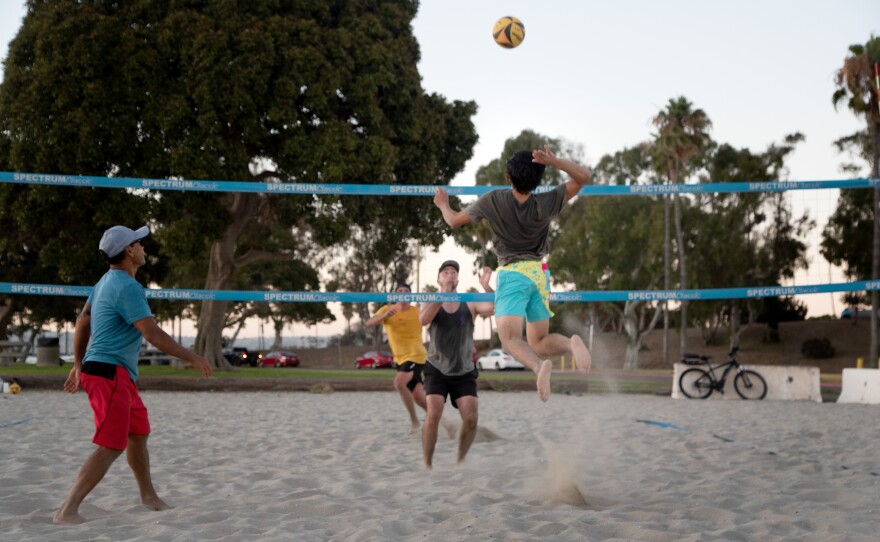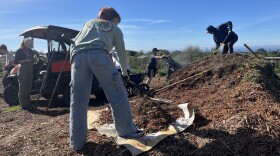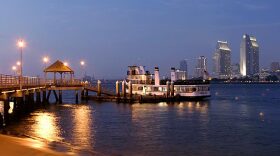Every Tuesday night, volleyball nets are set up at Mariner’s Point Park in Mission Bay. People flock to the beach, catching up with old friends and meeting new people while joining pickup games and drills.
Some have been playing volleyball for more than 40 years. Others just started that week. They range in age from college students to retirees who just want a little bit of exercise. Here, they all have a chance to play.
These are not professional players. They all come to play, socialize and get exercise together in the adult recreational league Life’s A Beach Volleyball.
Daniel Palenchar started Life’s A Beach because of his passion for inclusivity in sports.
“We exist for really everybody,” he said. “Our mission is to make beach volleyball accessible for all people.”
Life’s A Beach isn’t the only adult recreation league in town. There are many running games and tournaments in every sport from kickball to tennis. But last month, organizers found out that their leagues are going to get a lot more expensive.
On July 1, for-profit adult sports leagues in San Diego saw a jump in team fees, sometimes more than doubling. The fees for one team to use a field with lights for a season went from $138 in March to $393. And that additional cost will most likely be passed on to players.
Kevin Hellman has been playing softball his entire life and has run San Diego Softball since 1987. He said he already had to contend with other rising costs, including the price of equipment, and the jump in team fees could be too much for players.
“It’s just a big increase for people to stomach when they can't afford to buy groceries,” he said.
San Diego’s budget problems are behind the increases. The city had to find new revenue streams to balance its budget this year.
Increasing team fees would allow the city to almost break even on the cost of maintaining the fields, lighting them, paying employees who staff recreation centers and other costs, said Baku Patel, a policy analyst at the city’s Office of the Independent Budget Analyst. Currently, the city subsidizes the use of fields and courts, so users don’t foot the whole bill themselves.
The Parks Department recommended slowly raising the fees over the next year. But the City Council decided on an abrupt approach — hiking fees by up to $228 per team at the beginning of July, which covers 90% of the total cost of providing fields for sports leagues. The sudden increase in expenses has left leagues reeling.
Many organizers didn’t find out that their fees were increasing until they applied for their permits for the upcoming season. The jump in cost is so significant that many will be forced to drastically increase the costs they charge teams. That runs the risk of pricing out players.
For many business owners who run these leagues, it can feel like they are bearing an undue burden, Hellman said.
“I understand the city is trying to close a crazy budget gap,” he said. “But don't do it on the back of the citizens that just want to run around for an hour.”

The increased fees impact for-profit companies only, including Volo Sports, a nationwide company, as well as local companies like San Diego Softball, said City Councilmember Joe LaCava. The council has been subsidizing these businesses up until now by charging them a user fee that sometimes only covered 40% of the costs to maintain the facilities, he said.
“Those organizations can make their choices about how much they charge the participants and how their business model works,” LaCava said. “This was a tough year. We had to squeeze every place we could … A lot of other fees and fines were increased as well.”
Nonprofit adult leagues and for-profit kids sport leagues will not see a price jump, he said. But the few nonprofit adult leagues, like the YMCA, don’t necessarily have the space for all the people who want to participate.
And the increase will disproportionately affect smaller companies. Some for-profit leagues don’t have full-time employees and are run by one person part-time. Some are just breaking even or already in debt, said Life’s A Beach's Palenchar.
LaCava acknowledged that the fee increase didn’t account for the wide variety in businesses that it affected.
“Certainly we've heard from some of the smaller outfits that they make just enough to make it worth their effort,” he said. “They're doing it as much for the passion as they are for the minimal amount of net proceeds that they achieve there.”
LaCava wants to explore other options for leagues in the future, including a possible model where the city would get a portion of the recreation league’s profit or different fee scales based on a business’s size.
But that won’t come in time for league leaders this season. Some said the increase will make it much more difficult for people to participate in recreational activities after work.
Ducote Contreras was the managing director of Volo San Diego until this April, and said the prices are untenable for community members. He said Volo couldn’t find a way to keep players’ fees the same and still provide their service.
“It's just something we can't do,” he said. “It would have people paying upwards of almost $200 to play kickball, and that just doesn't make any sense. We're in the business of creating community and getting people together.”
The City Council also voted against a proposed roughly $5 increase for youth sports teams. Part of their reasoning was that even a small increase could affect many families' ability to participate in recreation.
Many adult league leaders agree that recreation is crucial to people’s health and wellbeing, and argue those benefits are still important, even after people stop being kids.
“We can really step in and give a chance for that person who just moved here to find their community, to find what's going on just a couple of blocks from their home or right after work,” Contreras said. “I do feel very strongly that having these outlets for adults is extremely important for people's lives.”






